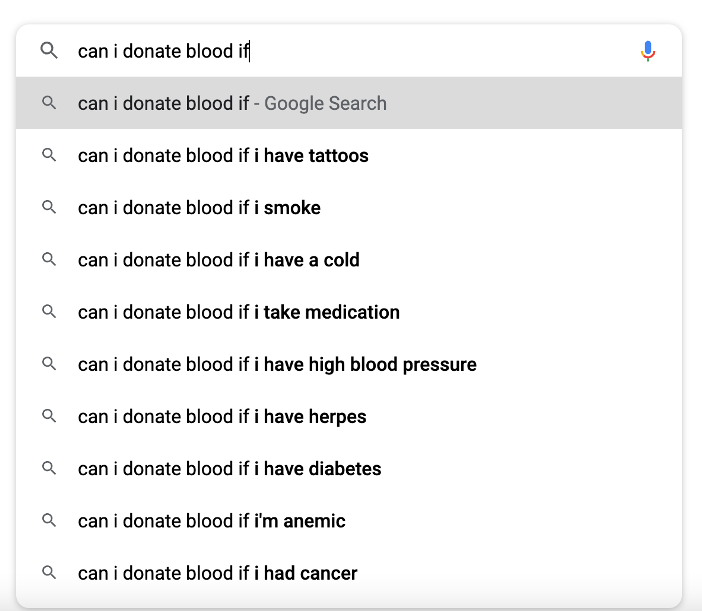
Most Commonly Googled Questions About Blood Donation — Answered by the Experts, Part 2
Have you ever turned to Google for help before a donation? Say, to find out how you could bulk up on iron, or to find out if your newfound cold would be cause for deferral? Or perhaps you asked Google a few questions before you made an appointment, to see if blood donation was right for you — whether it’s really effective, how much it hurts (which can be a daunting fear the first time), whether you’d feel tired after?

Wendy Pituley, Stanford Blood Center Resource Nurse
Whether you’ve directly contributed to Google’s database of questions or not, the truth is, blood donation is a very commonly searched topic. To help shed light on some of the most common inquiries and misconceptions around blood donation, we sat down with some of our SBC experts and asked them some of the most popular questions on the Internet about blood donation, as determined by the phrases Google uses to autocomplete the start to blood donation questions. For five weeks, we’re sharing answers to the top Googled questions in a few categories: “Can I donate blood…?”; “Does blood donation…?”; “How does blood donation…?”; “Are blood donations…?”; and “Do blood transfusions…?”
This week, we’re covering the most commonly Googled beginning with “Can I donate blood if,” as answered by SBC’s Resource Nurse and deferral specialist, Wendy Pituley! All the questions we’ll be answering are in this article’s header image so feel free to browse for the ones you’re especially anxious to know down below, or test your knowledge against our expert!
Can I donate blood if I have tattoos?
Yes! As long as the tattoo has completely healed by the time you donate, and you were inked in a CA-licensed facility, there’s no deferral. Short, temporary deferrals do exists for tattoos from non-licensed facilities or outside of CA, which you can read about here.
Can I donate blood if I smoke?
There is no deferral for smoking cigarettes, cigars or other tobacco products. Similarly, there’s no deferral for smoking weed — you just have to make sure you aren’t high at the time of donation!
Can I donate blood if I have a cold?
While we appreciate your eagerness to donate — sniffles and all! — we require that all donors be healthy the day of their donation for their own wellbeing as well as to prevent the spread of any illness to others donating or working at the same location that day. Rest up, and we’ll see you back soon!
Can I donate blood if I take medication?
Believe it or not, most medications, even those prescribed by a doctor, actually are not a cause for deferral! You can find the full list of medications that would prevent you from donating on our website here.
Can I donate blood if I have high blood pressure?
To donate, your blood pressure has to be below 180 systolic (first number) and below 100 diastolic (second number). So, those who have high blood pressure but are managing with medication would be allowed to donate.
Can I donate blood if I have herpes?
Yes, so long as you aren’t having a symptom outbreak/episode currently, and you haven’t taken an antiviral treatment as a result of an outbreak in the past 48 hours. Antivirals to prevent an outbreak are not cause for deferral.
Can I donate blood if I have diabetes?
Yes! People with both type 1 and type 2 diabetes are eligible to give blood, so long as they are otherwise healthy and are closely monitoring and maintaining their blood sugar levels. Medication for managing diabetes is also not cause for deferral.
Can I donate blood if I’m anemic?
Anemia is noted by a low level of hemoglobin. To donate blood, you have to meet a certain lower level of hemoglobin so that we know it’s safe for you to donate that day. If you often experience anemia but have it under control by taking iron supplements and/or eating iron-rich foods, you will likely be able to meet this lower level requirement and are welcome to donate!
Can I donate blood if I had cancer?
We are truly thankful for those who want to give back to other patients after recovering from cancer! In fact, most individuals who’ve completed treatment and have been cancer-free for a year are eligible to donate, though anyone who has had blood cancers, which includes leukemia, lymphomas and multiple myeloma (and any other hematologic malignancy), are unfortunately permanently deferred. If you have questions, we encourage you to contact our Resource Nurse to go over your particular situation and see if you’re eligible: 650- 725-7336.
Read the rest of our Google Q&A series on our blog.
